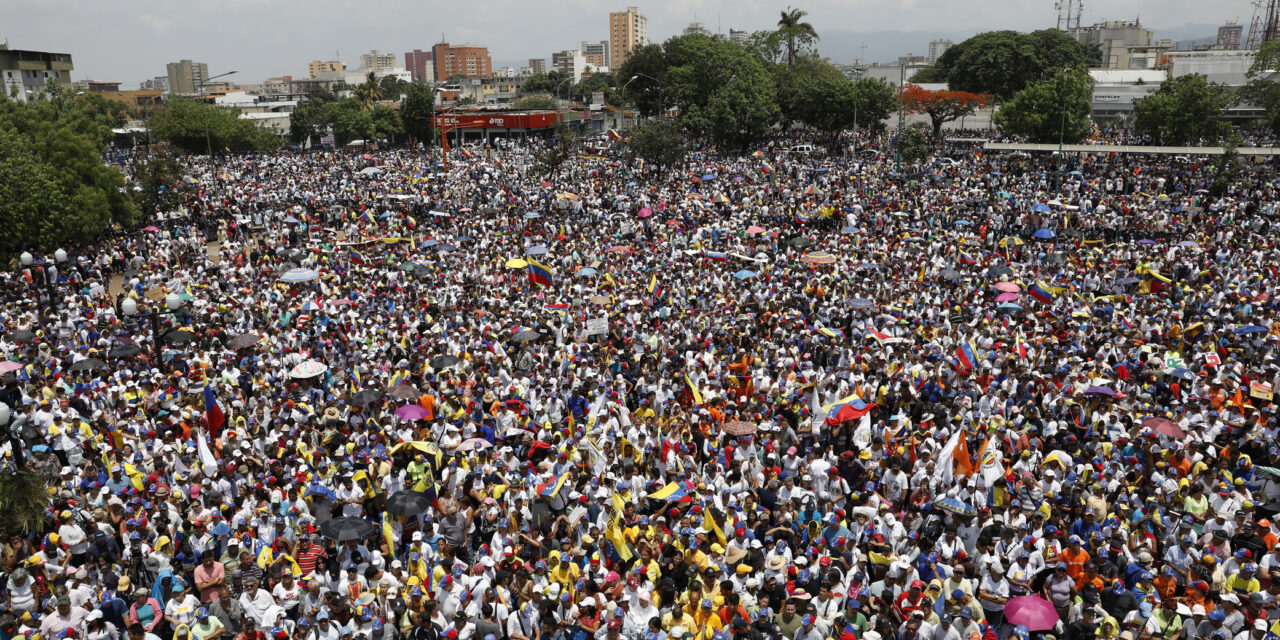When a new administration takes office on January 20, Venezuela’s descent into authoritarianism will pose a unique challenge to President-elect Joe Biden and his foreign policy advisors. Venezuela’s de facto government under Nicolás Maduro appears more consolidated than at any point in the last two years, while opposition leaders face increasing repression and greater challenges to their mobilizing capacity on the ground. With this in mind, the Washington Office on Latin America (WOLA) is publishing a new policy memo assessing challenges and opportunities facing the next U.S. administration. In Recalibrating U.S. Policy in Venezuela: Learning from Failure and Seizing Opportunities, WOLA Director for Venezuela Geoff Ramsey and Senior Fellow David Smilde assess the main failures of the Trump administration and lay out concrete actions the incoming Biden administration can take to improve the prospects for a peaceful, democratic solution to the crisis.
The report finds that the Trump administration’s approach to Venezuela has been marked by three key mistakes: abandoning multilateralism and seeking U.S. primacy in confronting Maduro, a miscalculated and over-broad pressure strategy, and a failure to engage with relevant international and national stakeholders. In combination with each other and with external factors, these missteps have held back the search for a peaceful, democratic solution to the crisis.
In their memo, Ramsey and Smilde offer a series of concrete policy recommendations for the next administration. When President-elect Joe Biden takes office on January 20, they conclude that he should:
- Work with European and Latin American partners to convene an international summit of stakeholders, including Maduro sponsors such as China, Cuba, and Russia. One clear opportunity lies in establishing a new approach to Cuba policy, which does not frame a transition in Venezuela as the first step in an existential threat to the island’s government.
- Develop a new diplomatic strategy to improve communication with rivals such as China and Russia, with the goal of exploring areas of mutual interest in Venezuela. Venezuela’s protracted stalemate is reinforced by wider geopolitical interests, especially regarding Venezuela’s abundant oil resources. Establishing clear lines of mutual interests among all the large powers involved could be the key forward.
- Direct senior Western Hemisphere policy officials in the National Security Council and State Department to closely coordinate with the Norwegian Ministry of Foreign Affairs in order to re-establish credible negotiations. The 2019 talks in Oslo and Barbados, facilitated by Norwegian diplomats, were the most credible negotiations yet. The U.S. government should offer full support to these efforts and stay closely engaged with Norwegian diplomats.
- Support progress towards initial, partial agreements as a way of building social capital needed to advance a comprehensive political solution. A June 2020 agreement to implement a response to the pandemic between Maduro’s Ministry of Health and the Humanitarian Aid Commission of the National Assembly, coordinated by the Pan American Health Organization (PAHO), was a tremendous achievement and shows that such agreements are possible.
- Clearly and unequivocally state that the U.S. government does not support military intervention, and instead back multilateral diplomacy which emphasizes the need for free and fair elections as the only solution to the crisis. Maintaining any kind of military intervention on the table has only served to divide international allies while keeping the opposition trapped in a debate that de-incentivizes domestic organizing.
- Convene an inter-agency task force to review Venezuela sanctions and related indictments, with the goal of reforming policy in ways that alleviate the humanitarian crisis and more effectively contribute to a return to democracy. This task force should also recommend ways to advance a more internationally-coordinated individual sanctions strategy, as well as to ensure that any indictments of key regime figures do not pose an obstacle to a transition.
- Instruct the Treasury Department’s Office of Foreign Assets Control (OFAC) to immediately re-establish humanitarian exemptions which permit Venezuela to trade crude oil in exchange for diesel. Importantly, reinstating these exemptions for diesel swaps will not require any kind of public announcement or general license, as these transactions were approved on an individual basis by OFAC. Failure to do so would have profound consequences for the poorest sectors of society that are already in an extremely vulnerable situation.
- Commit to a fully-funded humanitarian response inside Venezuela, while also pushing for better access for humanitarian actors. The Biden administration should communicate its willingness to provide more support for the UN response inside Venezuela, as well as for independent humanitarian organizations on the ground. However, U.S. officials must make clear that greater aid can only be provided if national and international humanitarian actors are given greater access to distribute assistance apolitically.
- Commit to increasing funds for the joint United Nations High Commissioner for Refugees (UNHCR) and International Organization for Migration (IOM) regional response to fleeing Venezuelans. The State Department should also encourage countries receiving U.S. assistance to adjust their migration policies to provide greater access to regular status and essential services, as many countries agreed to in principle in the Quito Declaration of 2018.
- Immediately instruct the Department of Homeland Security to designate Venezuela for Temporary Protected Status (TPS),a humanitarian program that allows those eligible to live and work in the United States. The next administration can send a clear message of support for fleeing Venezuelans by granting TPS to prevent authorities from returning Venezuelans to risk.



